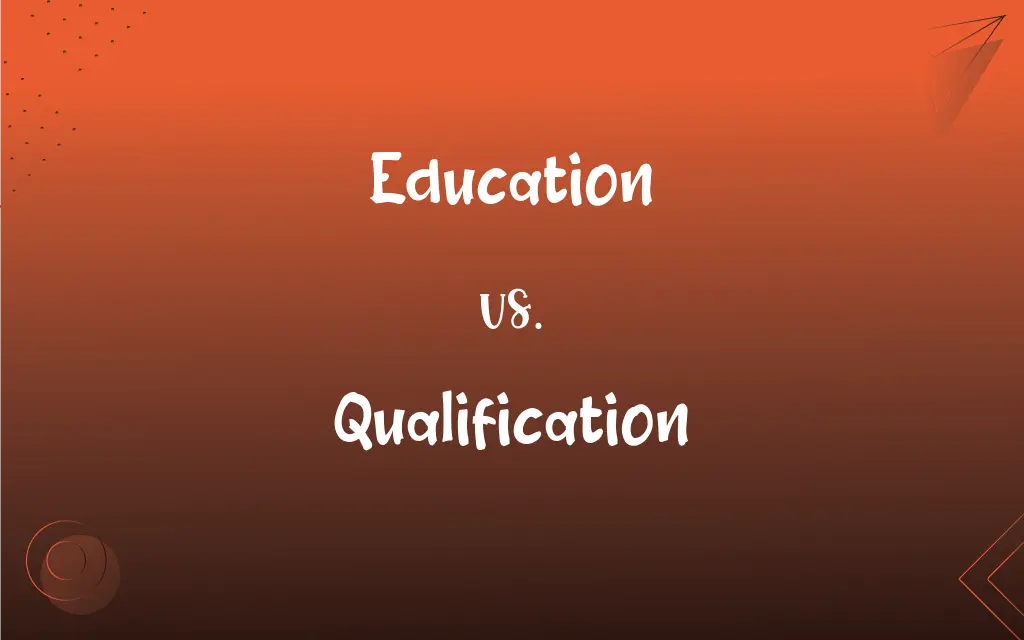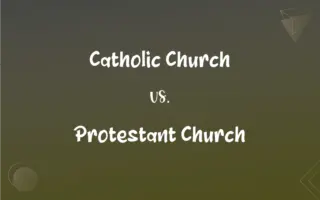Education vs. Qualification: What's the Difference?
Edited by Aimie Carlson || By Janet White || Published on December 30, 2023
Education is the process of receiving or giving systematic instruction, especially at a school or university. Qualification is a credential or record of achievement signifying competence in a specific field or subject.

Key Differences
Education refers to the systematic process of acquiring knowledge, skills, values, and beliefs through methods like teaching, training, or research. It often encompasses a broad spectrum of learning environments and experiences. In contrast, qualification is a specific acknowledgment or certification that an individual has acquired a particular level of skill or knowledge in a certain area, usually through formal education or training.
While education is a continuous and lifelong process, qualifications are often finite and achievement-based. Education encompasses the overall intellectual, moral, and social development of an individual, whereas qualifications are typically focused on specific competencies and are used as a benchmark for suitability in various professional or academic fields.
Education can be formal or informal, structured or unstructured, and it does not necessarily lead to a qualification. It includes a wide range of experiences, from classroom learning to self-study and experiential learning. On the other hand, qualifications are formal recognitions, often necessary for certain jobs or higher education opportunities, demonstrating that a person has successfully completed an educational or training program.
The value of education lies in its capacity to broaden one's perspective, foster critical thinking, and cultivate a lifelong love for learning. Qualifications, in contrast, often serve a more pragmatic purpose, providing a tangible testament to one’s skills and knowledge that can be presented to employers or educational institutions.
In essence, education is about the journey of learning and personal growth, whereas qualifications are about the destination, signifying the culmination of a particular educational or training endeavor. Both are crucial, but they serve different purposes in personal and professional development.
ADVERTISEMENT
Comparison Chart
Nature
Broad and continuous process
Specific and finite achievement
Purpose
Overall intellectual, moral, and social development
Demonstrate competence in a specific field
Structure
Can be formal or informal
Typically formal and structured
Outcome
Personal growth and broadened perspectives
Credential or certification
Use
Lifelong learning and self-improvement
Professional or academic suitability
ADVERTISEMENT
Education and Qualification Definitions
Education
Education is a process of facilitating learning, or the acquisition of information, skills, values, and habits.
His education in environmental science sparked a lifelong passion for conservation.
Qualification
Qualification encompasses the skills, experience, and education that make someone suitable for a particular job or activity.
Her qualification in bilingual education was essential for her role as a language teacher.
Education
Education is the systematic pursuit of knowledge and understanding as a lifelong endeavor.
Continuous education is key to staying relevant in rapidly changing industries.
Qualification
Qualification refers to the completion of a course or program, resulting in a certificate, diploma, or degree.
His qualification in advanced mathematics opened many doors in his career.
Education
Education is the acquisition of knowledge, skills, and values through learning and teaching.
The education she received at the university prepared her for a successful career.
Qualification
A qualification is an official record showing that you have finished a training course or have the necessary skills, etc.
After obtaining his qualification as a certified accountant, he started his own firm.
Education
Education involves structured teaching and learning, especially at a school or university.
Her education in law was instrumental in shaping her analytical skills.
Qualification
A qualification is a certification or degree that shows someone is trained and skilled in a particular area.
She earned her qualification in graphic design after two years of intensive study.
Education
Education is an enlightening experience and a process of personal and intellectual development.
The education he received went beyond academics, teaching him valuable life lessons.
Qualification
A qualification is a credential signifying a person's ability to perform a specific role or task.
His qualification as a first-aid instructor is crucial for his role in emergency services.
Education
The act or process of educating or being educated.
Qualification
The act of qualifying or the condition of being qualified
Qualification for the tournament will be hard.
Education
The knowledge or skill obtained or developed by a learning process.
Qualification
A quality, ability, or accomplishment that makes a person suitable for a particular position or task.
FAQs
Do all jobs require qualifications?
Not all jobs require formal qualifications; some value experience or skills more.
Can education lead to a qualification?
Yes, education can lead to a qualification, especially through formal courses.
Is qualification necessary for a successful career?
While not always necessary, qualifications often enhance career prospects.
Can qualifications guarantee a job?
Qualifications improve job prospects but don't always guarantee a job.
What is the primary focus of education?
Education primarily focuses on learning and intellectual development.
Is continuous education important?
Continuous education is important for personal and professional growth.
Can someone be educated without qualifications?
Yes, one can be educated without formal qualifications through self-study or experience.
Is education only received in schools?
Education can occur in various settings, not just in schools.
Can qualifications expire or become outdated?
Some qualifications may need updating, especially in fast-changing fields.
Is there a difference between being educated and being qualified?
Yes, being educated refers to a broad learning process, while being qualified is about specific competencies.
How does education contribute to society?
Education contributes to societal development by fostering informed and skilled individuals.
Can qualifications be obtained online?
Many qualifications can now be obtained through online courses.
How do qualifications affect professional credibility?
Qualifications often enhance professional credibility and trustworthiness.
Are qualifications universally recognized?
Not all qualifications are universally recognized; it varies by country and field.
What is the significance of lifelong education?
Lifelong education is significant for continuous skill and knowledge development.
Can education shape one's values and beliefs?
Yes, education can significantly shape an individual's values and beliefs.
Can education be informal?
Education can be informal, such as learning through life experiences.
Are vocational qualifications considered formal education?
Yes, vocational qualifications are a part of formal education systems.
How do qualifications impact career advancement?
Qualifications often facilitate career advancement and opportunities.
What is the role of education in personal development?
Education plays a key role in personal development, enhancing knowledge and skills.
About Author
Written by
Janet WhiteJanet White has been an esteemed writer and blogger for Difference Wiki. Holding a Master's degree in Science and Medical Journalism from the prestigious Boston University, she has consistently demonstrated her expertise and passion for her field. When she's not immersed in her work, Janet relishes her time exercising, delving into a good book, and cherishing moments with friends and family.
Edited by
Aimie CarlsonAimie Carlson, holding a master's degree in English literature, is a fervent English language enthusiast. She lends her writing talents to Difference Wiki, a prominent website that specializes in comparisons, offering readers insightful analyses that both captivate and inform.






































































